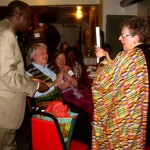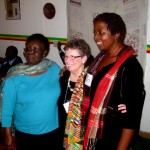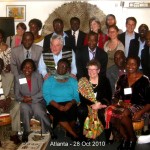2014
A new book by Jim Cox
James L. Cox, 31.01.2014, The Invention of God in Indigenous Societies. Edinburgh: Acumen Publishers, 192 pp., ISBN-13: 978-1844657551 (pbk), BP17.99, discount price BP14.39
Indigenous societies around the world have been historically disparaged by European explorers, colonial officials and Christian missionaries. Nowhere was this more evident than in early descriptions of indigenous religions as savage, primitive, superstitious and fetishistic. Liberal intellectuals, both indigenous and colonial, reacted to this by claiming that, before indigenous peoples ever encountered Europeans, they all believed in a Supreme Being. ‘The Invention of God in Indigenous Societies’ argues that, by alleging that God can be located at the core of pre-Christian cultures, this claim effectively invents a tradition which only makes sense theologically if God has never left himself without a witness. Examining a range of indigenous religions from North America, Africa and Australasia – the Shona of Zimbabwe, the ‘Rainbow Spirit Theology’ in Australia, the Yupiit of Alaska, and the Maori of New Zealand – the book argues that the interests of indigenous societies are best served by carefully describing their religious beliefs and practices using historical and phenomenological methods – just as would be done in the study of any world religion.
CONTENTS:
Preface
1. The ‘God’ Controversy in Pre-Christian Indigenous Religions
2. Making Mwari Christian: The Shona of Zimbabwe
3. How God Became Australian: Transforming the Rainbow Serpent into the Rainbow Spirit
4. The Alaskan Exception: The ‘Person of the Universe’ and Christian Neglect
5. The Debate over Io as the Pre-Christian Māori Supreme Being
6. Indigenising God: The Conflict between Fact and Value
Bibliography
Index
Reviews
Cox’s insightful study of the concept of the ‘high god’ in four indigenous cultures, and its complex relationship with Christian missionary preaching of the Biblical God, is a major scholarly achievement.” – Carole M. Cusack, University of Sydney
“This book is an excellent argument for the need to study indigenous religions as the beliefs and practices of indigenous peoples, as traditions in their own rights.” – Bettina E. Schmidt, University of Wales Trinity Saint David
James L. Cox is Emeritus Professor of Religious Studies in the University of Edinburgh. His most recent books include ‘An Introduction to the Phenomenology of Religion; From Primitive to Indigenous: The Academic Study of Indigenous Religions‘ and ‘A Guide to the Phenomenology of Religion‘.
2014
AASR Pictures from AAR and SBL Atlanta 2010
2014
AASR Student Award
The African Association for the Study of Religions (AASR) promotes the academic study of religions in Africa through the international collaboration of scholars whose research has a bearing on the subject. The Association stimulates e.g. academic conferences both in Africa and overseas. The 6th AASR conference will be held at the University of Cape Town, South Africa, from July 30-August 3, 2014. The topic of the conference is ‘Religion, Ecology and the Environment in Africa and the African Diaspora’.
On the occasion of this conference, the Association is pleased to announce the presentation of the AASR Student Award. This award honours an individual African student whose paper makes an outstanding contribution to the topic of the conference. The recipient of the AASR Student Award will receive a cash prize of $ 500. As the award will be presented during the AASR conference in Cape Town, the first prize includes a return ticket to Cape Town from any leading airport on the African continent. The recipient of the award will be invited to present the winning paper during the conference, and the paper will be published in the AASR Bulletin. The ASSR Student Award also includes a second prize, of $ 300, and a third prize of $ 200 cash.
Nominations
Nominations for the AASR Student Award must be made by May 15, 2014. Electronic submissions may be sent to Professor Gerrie ter Haar at terhaar@iss.nl. Other members of the jury are Professor Elias Bongmba, Dr Frans Dokman and Dr Rosemary Amenga-Etego.
The jury accepts nominations from students registered at African universities only. Both Phd and Master students are invited to submit a paper for consideration. The maximum length is 5000 words, including references. To facilitate the objectivity of the review process, the name of the candidate, current mailing address and phone number should appear only on the title page of any paper submitted. The winner will be notified by June 21, 2014.
In the absence of a paper deemed to merit the award, the award may be withheld.
For further information about the AASR, the Cape Town conference and the (sub)themes related to the conference topic, please visit www.a-asr.org.
2014
2014 Consultation of African and African Diasporan Women in Religion and Theology
CALL FOR PAPERS
2014 Consultation of African and African Diasporan Women in Religion and Theology
Theme: Texts of Terror, Texts of Empowerment: Reimagining Sacred Canon
in Africana Womanhood
The Consultation of African and African Diasporan Women in Religion and Theology invites proposals for paper presentations at the 2014 meeting. Proposals engaging any religious tradition and on any of the wide variety of topics related to the consultation’s theme – Texts of Terror, Texts of Empowerment: Reimagining Sacred Canon in Africana Womanhood – are welcome. ALL proposals should clearly and specifically (1) integrate discussion of sacred texts (in oral, written, or embodied forms) and (2) consider the relationship of sacred texts to any forms of violence against continental and diasporan African women and girls. Proposals may not exceed one single-spaced page and should include the proposer’s name and email address, a title, the proposer’s institutional affiliation, and a clear indication of how the proposed presentation considers violence, African-descended women, and sacred texts. Send proposals to ghanaconference2014@gmail.com. The deadline for proposals is March 1, 2014.
The second Consultation of African and African Diasporan Women in Religion and Theology will take place July 6-14, 2014, in Legon, Ghana. The 2014 meeting extends work of the 2012 conference by continuing the focus on overcoming violence against continental and diasporan African women and girls and seeking to build relationships of continental and diasporan African women in religion and theology. Roots of these meetings began during the 1970s and 1980s when Mercy Amba Oduyoye, Brigilia Bam, Musimbi Kanyoro, Katie Geneva Cannon, Jacquelyn Grant and others first encountered each other as the earliest continental and diasporan African women’s voices at transnational Christian denominational and interdenominational meetings.
2014
Happy New Year from AASR President Elias Bongmba
Dear Colleagues,
Happy new year to you.
I write to thank you for your service AASR in 2013 and give you some updates. Because of the nature of the updates, I have taken the liberty to copy colleagues who are not members of the executive or country or regional representatives but involved with the conference planning.
We look forward to 2014 with excitement as we will all gather in Cape Town July31-August3 for the 6th AASR conference. The Co-Chairs, Abdulkader Tayob and Madipoane Masenya are doing an excellent job and I am very pleased to be working with both of them on a daily basis.
As we celebrate the new year permit me by way of summary to pass on information to you on different things that relate to AASR and the conference.
First, I encourage you to renew your membership and also encourage all members in your country and region to renew their membership for 2014. We plan to update our membership rolls by listing those who are current on their membership dues.
Second, if you plan to arrive in Cape Town early, and choose to stay with friends, relatives, or at another hotel, please consider booking the conference hotels for the duration of the conference. This is important for us to keep the special rates that have been arranged for us.
Third, the International Society for the Study of Religion, Nature and Culture (ISSRNC) who are co-sponsoring the conference with us will post an announcement on their website that Professor Bron Taylor is the keynote speaker at the conference. We will give the same information to Melissa to post a on our website. We will also pass on to Melissa information about two plenary speakers when we receive biographical information from them.
Fourth, we hope that a senior member of the South African Government will address the conference. We have made initial contacts and will follow up with out invitation after elections are held in the Spring of 2014 in South Africa.
Finally, I had a conversation with Afe and Damaris about progress on the publication of selected papers from the Kenyan Conference, and I am glad to report that Afe is working on it and when all papers are in and decisions have been made, he and the editorial team will submit a book proposal to an editor for consideration. I must apologize to all of you and to Afe that I did not pass on this information earlier. Afe reminded me in a recent correspondence that he gave me that information in Liverpool.
Thank you again for your hard work on behalf of ASSR.
Sincerely,
Elias K. Bongmba
President of ASSR




